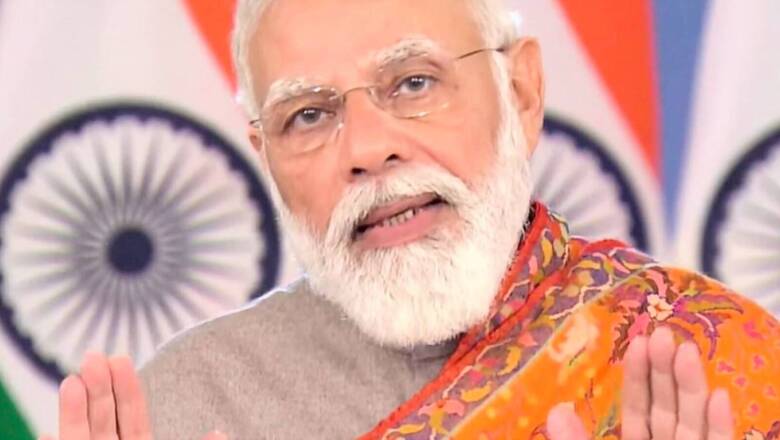
views
The Centre will repeal the three farm laws, Prime Minister Narendra Modi announced on Friday, marking a climbdown by his government to meet the unrelenting demand of farmers protesting in several states against the reform measures for over a year.
Making the announcement during a televised address to the nation on the occasion of Sikhism founder Guru Nanak’s birth anniversary, Modi appealed to protesting farmers to call off their agitation against these reform measures and return home as he called for a new beginning.
The constitutional formalities to revoke the laws will be done in Parliament’s winter session beginning from November 29, the Prime Minister said on Friday, nearly a week before the first anniversary of the start of the stir at several Delhi border points including Singhu.
The ruling BJP hopes that the government’s decision will placate Sikhs, who are in a majority in the border state of Punjab, and Jats, a major demographic constituency in the western region of UP, and will cancel out political headwinds it has encountered in the two poll-bound states besides Haryana.
The protests have been most intense in these regions of north India. This will also ease the path for an alliance between the BJP and former Punjab chief minister Amarinder Singh, who lauded the announcement as “great news” and thanked Modi for acceding to the demand of every Punjabi.
The Prime Minister spoke at length about the benefits these laws were expected to bring to farmers, especially those with small landholdings, and his government’s good faith in enacting these legislations. The government brought them with full integrity and clear conscience in the interest of farmers and country, he added.
He then apologised to people of the country, saying he wanted to convey to them with a “sacred heart” that there may have been some shortcomings in the government’s efforts that it could not convince some farmers about the truth which was “as clear as the light of a candle”. He noted that many farmer bodies, agriculture experts and scientists, and progressive farmers backed the laws.
“Despite our efforts, we could not convince some farmers. Even though it was only a section of farmers who were opposing, but they were still important for us We continued to convince them will all humility and open mind,” Modi said, noting that his government had offered to suspend the laws for two years and amend the provisions which had drawn objections.
The Supreme Court has put the laws in abeyance. Noting that the day of Guru Nanak’s birth anniversary was not the occasion to blame anyone, he said, “I want to tell you, the entire country that we have decided to repeal the three agriculture laws.”
“I would request all my protesting farmer brothers, today is the auspicious day of Guru Purab, return home, to your fields and family and make a new beginning, let us move forward afresh,” he said. While farmers’ unions described the announcement as a huge victory, opposition parties claimed that the upcoming state elections in Punjab and Uttar Pradesh, which have a huge base of farmers, forced the decision.
The Prime Minister’s decision to revoke the laws protests marks the second time his government has taken a decision of such magnitude in the face of popular protests since coming to power in 2014. In 2015, it had allowed the land ordinance to lapse as opposition parties mounted a strong protest, with Congress leader Rahul Gandhi using “suit-boot ki sarkar” jibe.
In his address, Modi also announced the formation of a committee to promote zero budget-based agriculture, a term for farming based on natural fertilizers and local seeds, to change crop patterns as per the changing needs of the country and to make MSP more effective and transparent.
The Committee will have representatives of the central government, state governments, farmers, agricultural scientists, and agricultural economists, he said. The goal of the three farm laws was to empower farmers, especially small farmers, the Prime Minister said, asserting that in his over five decades of public life he has seen the difficulties and challenges facing farmers from very close quarters.
When the country gave him the opportunity to serve as ‘Pradhan Sevak’ in 2014, he gave top priority to agriculture development and farmers welfare, he said, listing various steps taken for the welfare of small farmers and pointing out that the agriculture budget has risen by five times with over Rs 1.25 lakh crore being spent annually.
Many initiatives were taken by his government for the farmers to get the right price for their produce and rural market infrastructure was strengthened. “We not only increased the MSP but also created a record number of government procurement centres. The procurement of the produce made by our government has broken the records of the last several decades”, he said.
The Centre, which has held 11 rounds of formal dialogue with the farmers, had been maintaining that the new laws are pro-farmer, while protesters claim they would be left at the mercy of corporations because of the legislation.
Several farmer bodies had been protesting against the laws since they were passed in Parliament in September last year after being first enacted through ordinances.
They were encamped at Delhi’s borders since November 2020, seeking the repeal of the Farmers’ Produce Trade and Commerce (Promotion and Facilitation) Act, 2020, Farmers’ (Empowerment and Protection) Agreement on Price Assurance and Farm Services Act, 2020 and the Essential Commodities (Amendment) Act, 2020. They also sought a new law to guarantee a minimum support price for crops.
Read all the Latest India News here




















Comments
0 comment